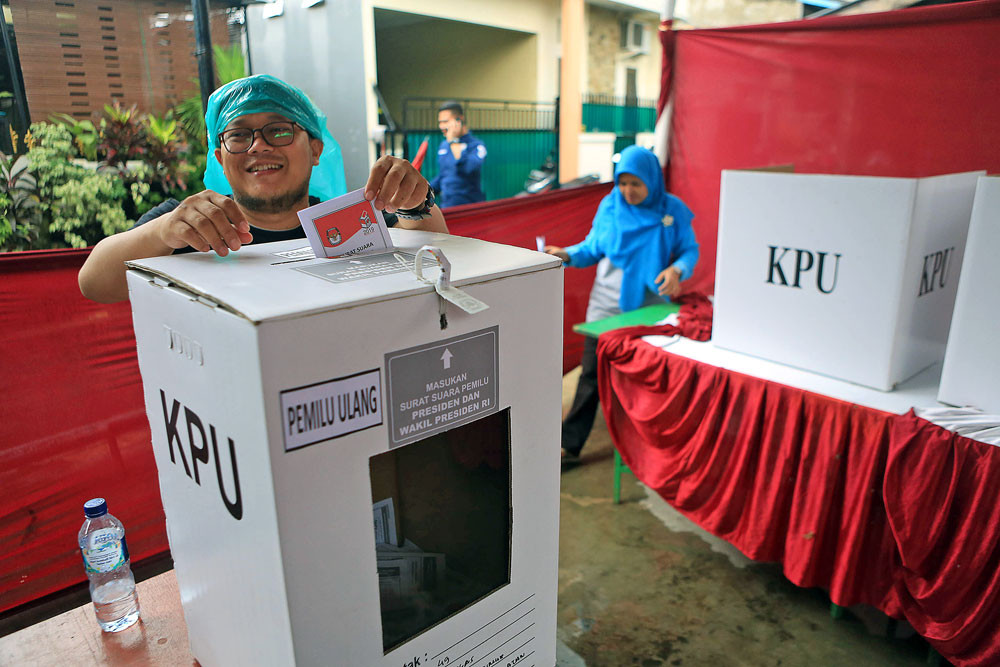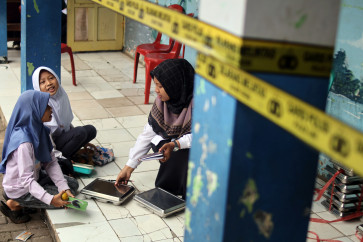Popular Reads
Top Results
Can't find what you're looking for?
View all search resultsPopular Reads
Top Results
Can't find what you're looking for?
View all search resultsMinor parties slam plan to raise legislative threshold
Change text size
Gift Premium Articles
to Anyone
T
hree political parties that control a small number of seats in the House of Representatives have objected to a plan to increase the legislative threshold for the 2024 elections, arguing that it would undermine the country’s democracy.
Major parties in the House are seeking to raise the requirement to acquire seats in the House from 4 percent of the national vote to 7 percent, in a draft bill dated May 6 to revise the 2017 General Elections Law. The proposal was reportedly first drafted by the Golkar Party, which received the third most votes in the 2019 elections with 12.31 percent, and the NasDem Party, which came fifth with 9.05 percent of the vote.
The Democratic Party, the National Mandate Party (PAN) and the United Development Party (PPP) – the three parties at risk of losing representation in the House in 2024 if a higher threshold is introduced – demand the threshold be maintained at 4 percent.
The three parties said a higher threshold would mean voters would lose political representation and result in millions of votes being worthless.
In the 2019 legislative elections, the Democratic Party secured 10.86 million votes, or 7.77 percent of the vote, while PAN secured 6.84 percent and the PPP 4.52 percent.
“If the threshold is increased, a lot of votes will go to waste,” the Democratic Party’s strategic communication head, Ossy Dermawan, said recently. “The plan will not only undermine people’s political representation, but will also benefit major political parties, as they can use their domination in the House to pursue their own interests.”
PAN lawmaker Guspardi Gaus said that newcomer parties hoping to bring fresh ideas to the legislative body would find it harder to enter the House should the plan be approved. He expressed concern it would double the number of votes that do not result in representation in the House.
According to the General Election Commission (KPU), 13.5 million votes, or 9.6 percent of the 139.97 million valid votes cast in the 2019 elections, did not result in representation in the House. These votes were cast for candidates from eight parties that failed to meet the 4 percent threshold, such as the Indonesian Solidarity Party (PSI), the Crescent Star Party (PBB) and the Perindo Party.
PPP deputy chairman Arwani Thomafi said while the party opposed the proposal, it was too early to predict how it would affect the party's performance in the upcoming elections.
The three parties are now onboard with former contenders – smaller parties that failed to meet the legislative threshold in 2019 – and have also publicly voiced opposition to the proposal.
PSI secretary-general Raja Juli Antoni, for instance, has described the proposed revision as a threat to democracy and said “the public must be aware of it”, while Perindo secretary-general Ahmad Rofiq doubted whether major parties in the House had conducted a proper study to support the plan.
Indonesian Institute of Sciences (LIPI) political analyst Siti Zuhro said that by seeking to raise the threshold, major parties were complying with a 2019 Constitutional Court ruling that states that the country’s multiparty system should be simplified to strengthen the presidential system, as mandated by the Constitution.
“Nevertheless, it will be unfair for less popular political parties. They will stand no chance of getting into the House because of the provisions [in the draft bill], not because of losing the competition,” Siti said. “Is this appropriate in a democratic country such as Indonesia? I don't think so."
Khoirunnisa Dwi Agustyati of election watchdog the Association for Elections and Democracy (Perludem) said such a higher threshold was unnecessary, arguing it would instead increase the chances for wasted votes and the loss of political representation in the upcoming elections in 2024.
Both Siti and Khoirunnisa advised lawmakers to reduce the number of House seats in each electoral district to improve the electoral process and gradually simplify the multiparty system, as fewer seats would lower the chances for smaller parties to enter the House.
In the 2019 legislative elections, the KPU established 80 electoral districts, with each electing three to 10 representatives.
Saan Mustopa, deputy chairman of House Commission II overseeing home affairs and NasDem lawmaker, said the draft was not final and was still open to changes.
“We will thoroughly deliberate the draft with the nine factions in the House before sending it to the Baleg [House Legislative Body] for further deliberation,” he said.










